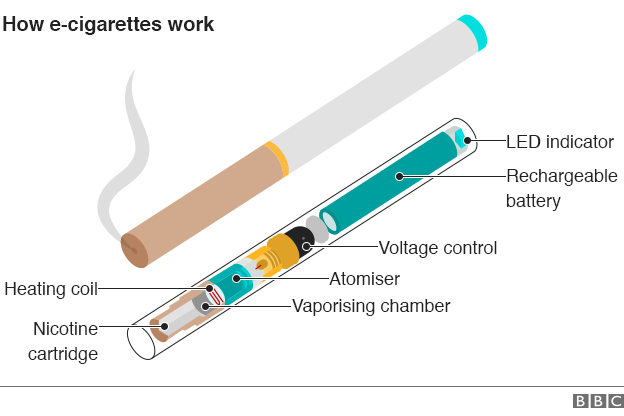Welsh children 'more likely to try e-cigs than tobacco'
- Published
Dr Julie Bishop: 'Something we should be concerned about'
Children are nearly twice as likely to try e-cigarettes rather than tobacco, Cardiff University research has said.
A paper published in the BMJ Open, external questioned 32,479 11-16 year olds in Wales.
While 18.5% said they had tried e-cigarettes, only 10.5% said they had smoked tobacco.
One Swansea e-cigarettes firm said it operated a "challenge" policy to people who looked under 25 to ensure products were not sold to young people.
Jon Nelsey, from ECigaretteDirect, said: "The vaping industry is here to stay and we want to be a reputable retailer. We don't want to be selling to youths. We don't think it's right."
The research said that while there was no evidence e-cigarettes made young people more likely to smoke, "youth e-cigarette use may become a public health issue if left unmonitored".
Smokers, ex-smokers and non-smokers were all questioned as part of the study, undertaken in 2015.
Of those questioned, 2.7% used e-cigarettes at least weekly and 41.8% of those who smoked daily also used them on a regular basis.

Elen de Lacy, lead author of the study, said: "Our data suggest that e-cigarette use is rapidly increasing among youths.
"Regular use by non-smokers remains very low, but is growing.
"The real need now is for further research to examine long-term youth e-cigarette and tobacco use and to understand e-cigarette use from young people's perspectives."
The findings said while those trying e-cigarettes had "grown rapidly" since 2013, most young people who had used both e-cigarettes and tobacco tried the latter first.
Jon Nelsey, from ECigaretteDirect: "We don't want to be selling to youths. We don't think it's right"
Dr Julie Bishop, from Public Health Wales, said young people using e-cigarettes on a regular basis "is something we should be concerned about".
A Welsh Government spokesperson said it was "disappointing to see that experimentation with e-cigarettes is increasing amongst young people".
The spokesperson added: "Nicotine can cause addiction and harm the developing adolescent brain, which is why we are working to prevent the use of e-cigarettes by children and young people.
"This includes the current age of sale legislation, external and restrictions on advertising."
- Published26 January 2017

- Published5 November 2016

- Published22 May 2016

- Published28 April 2016
